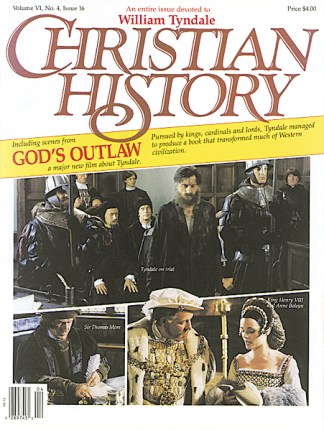How pleased we are to devote an issue to William Tyndale! His name is vaguely familiar to many modern Christians, but the majority of details about his fascinating life are familiar only to church history and literary scholars. Yet we will see with him, as we’ve seen with others treated in Christian History, that though he founded no modern movement, he nonetheless profoundly influenced our history and placed us enormously in his debt.
Tyndale’s main opposition during his lifetime came from the Roman Catholic Church’s supporters in England, with Lord Chancellor Sir Thomas More being among his most formidable foes. Thus, a special word of notice is in order for what the Catholic University of America Press is currently doing. CUAP is in the process of preparing newly revised editions of all of Tyndale’s polemical works. This series of books, to be called “The Independent Works of William Tyndale,” is scheduled for publication between 1992 and 1998.
Another notable part of this project is that Dr. Donald Smeeton, a contributor to this issue of Christian History, is set to coedit a major work in the series. Smeeton, a Protestant, is assistant dean at the International Correspondence Institute, a Christian correspondence school based in Brussels, Belgium. His doctoral dissertation was about Tyndale and, interestingly, he received his doctorate from the Catholic University of Louvain, the same school that Tyndale’s betrayer attended long ago.
We see with Tyndale, as with so many other figures we’ve treated, how God used an individual devoted to the rigors of research to advance His work—a point worth considering by young Christians making career decisions, in an age when, even in religious circles, the trend often seems to be to choose style rather than substance.
We are also struck with the truth (though we’ve seen it before—for example with Jan Amos Comenius in Issue 13) that a man of God, with fierce loyalties to his homeland, can sometimes, because of unique circumstances, best exercise his patriotism and faith only in exile. For Tyndale, as for Comenius, exile was a crucible that served to release and refine his distinctive gifts.
Tyndale’s story also reminds us that Christians who set no limits on their dedication can have massive positive influence on the powerful forces in control of societies. This is seen in the fact that Tyndale, who was once seen as the public’s enemy, is today heralded as one of its greatest benefactors, and that the Bible in English is a recognized bestseller every year.
Those of you who’ve been reading Christian History since its early days know that it was born out of my work as a filmmaker, being conceived while I was producing First Fruits—a film about the beginnings of the Moravian missionary movement. I realized then that we simply could not provide, in the film, all the background material necessary to really tell that magnificent story. So this magazine format was devised and tested, and was well-received.
The magazine soon became an entity all its own, published by the Christian History Institute. But we at the institute are still always eager to tie our efforts to noteworthy film productions that cover subject matter we’re also interested in treating. When used together, the film and print media can complment each other and make for a penetrating communication experience. It opens up a new and compelling way to approach our history.
Two such opportunities currently present themselves. First, we are happy to announce that the Christian History Institute itself plans to soon begin production on a series of documentary films about the early church. Covering from the end of the New Testament’s writing to the conversion of Constantine, this project was undertaken by CHI in cooperation with EO Television, a Christian TV network in Holland. More on this series in the future.
The second opportunity has to do with this issue. We were delighted to cooperate with Grenville Films in England on the production of a major new film on the life of Tyndale called God’s Outlaw. We commend the use of this issue with the viewing of the film, and express our gratitude for use of photography from the film that appears on the cover and these two pages.
Copyright © 1987 by the author or Christianity Today/Christian History magazine. Click here for reprint information on Christian History.










